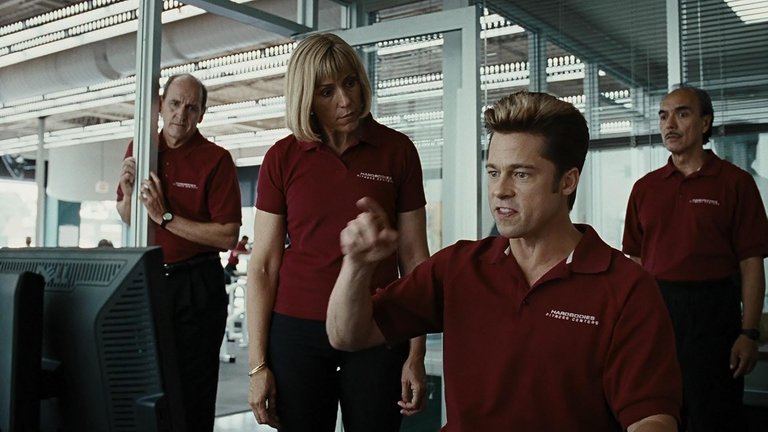Film Review: Burn After Reading (2008)

In contemporary Hollywood, celebrities often uncritically accept the narratives spun by unnamed US intelligence officials, treating them as gospel, even when these narratives advocate for policies that could lead to concentration camps for half of all Americans or bring the world to the brink of nuclear annihilation. This stands in stark contrast to the climate of suspicion and disdain that characterised US public sentiment towards the intelligence community in the years following the failures leading up to 9/11 and the Iraq War. The 2008 black comedy Burn After Reading, directed by Joel and Ethan Coen, encapsulates this ambivalence, reflecting a time when both Hollywood and much of the American public were deeply sceptical of governmental authority, particularly that of the CIA.
The plot revolves around CIA analyst Osborne Cox (played by John Malkovich), who is informed that he will be removed from his post due to a drinking problem. Instead of accepting a replacement job at the State Department, Cox resigns and decides to write a memoir that would reveal the most embarrassing government secrets. However, he is unaware that his wife, Katie (played by Tilda Swinton), is having an affair with Harry Pfarrer (played by George Clooney), a married US Marshal. Katie wants to divorce Osborne and, to research her husband's financial records, obtains a CD-ROM containing a draft of his book. This CD-ROM accidentally ends up at Hardbodies gym, where some employees believe it is a collection of top-secret documents. One of these employees is Linda Litzke (played by Frances MacDormand), a woman desperate to improve her dating life by undergoing a series of cosmetic surgeries that her health insurance won't cover. When her colleague and friend Chad Feldheimer (played by Brad Pitt) discovers the CD-ROM's original owner, he volunteers to help Linda blackmail Osborne, unaware that this would set off a chain of events leading to bloodshed.
Burn After Reading was the first film by Coen brothers after their critically acclaimed No Country for Old Men. It was met with generally positive reviews from critics who hold the Coens in high regard; however, its box office success can largely be attributed to its star-studded cast rather than its artistic merit. Despite the anticipation surrounding this project, it ultimately fell short of expectations.
One of the film's most significant shortcomings is its reliance on the absurdity and stupidity of its characters as a source of humour. The Coen brothers present nearly every character as delusional and self-serving, which makes it exceedingly difficult for audiences to empathise with them or even care about their fates.
The Coens' trademark misanthropy is evident in their portrayal of characters like Harry Pfarrer, who is reduced from suave and charismatic to a paranoid wreck. Clooney's performance in these scenes often veers into over-the-top territory, lacking the subtlety that could have made his character more relatable. Similarly, Frances McDormand's portrayal of Linda comes across as exaggerated and caricatured rather than nuanced. Even Chad, who initially appears to be an innocent character played by Brad Pitt, is depicted unsympathetically as he becomes embroiled in increasingly ridiculous situations.
While there are moments of genuine humour throughout Burn After Reading, many jokes fail to land effectively due to pacing issues. For instance, scenes depicting Harry dealing with the aftermath of his actions drag on without delivering satisfying comedic payoff. This inconsistency detracts from what could have been a tightly woven narrative filled with clever comedic moments.
In an interesting stylistic choice reminiscent of No Country for Old Men, the Coens opt not to show major plot developments directly but instead rely on characters’ narration to convey information. While this technique worked well in the previous film, here it feels self-indulgent and pretentious, resulting in an unfinished narrative that lacks proper resolution or catharsis for the audience.
Furthermore, Burn After Reading suffers from a lack of focus regarding its thematic intentions. The Coens seem uncertain whether they aim to parody spy thrillers or deliver a broader satire on various aspects of contemporary American life—such as online dating culture or society’s obsession with physical appearance. This ambiguity contributes significantly to the overall disappointment felt by audiences familiar with the Coens’ more cohesive works.
Despite these criticisms, it is essential to acknowledge that Joel and Ethan Coen direct with skill and precision; their ability to elicit strong performances from a diverse cast remains commendable. The film’s relatively short runtime helps mask some of its flaws and makes it more palatable for casual viewers seeking light entertainment. Certain scenes do resonate well within the context of dark comedy; however, as a whole, Burn After Reading stands among the lesser works in the Coen brothers’ oeuvre and can only be recommended to their most loyal fans.
RATING: 4/10 (+)
Blog in Croatian https://draxblog.com
Blog in English https://draxreview.wordpress.com/
InLeo blog https://inleo.io/@drax.leo
Hiveonboard: https://hiveonboard.com?ref=drax
Rising Star game: https://www.risingstargame.com?referrer=drax
1Inch: https://1inch.exchange/#/r/0x83823d8CCB74F828148258BB4457642124b1328e
BTC donations: 1EWxiMiP6iiG9rger3NuUSd6HByaxQWafG
ETH donations: 0xB305F144323b99e6f8b1d66f5D7DE78B498C32A7
BCH donations: qpvxw0jax79lhmvlgcldkzpqanf03r9cjv8y6gtmk9
Posted Using InLeo Alpha